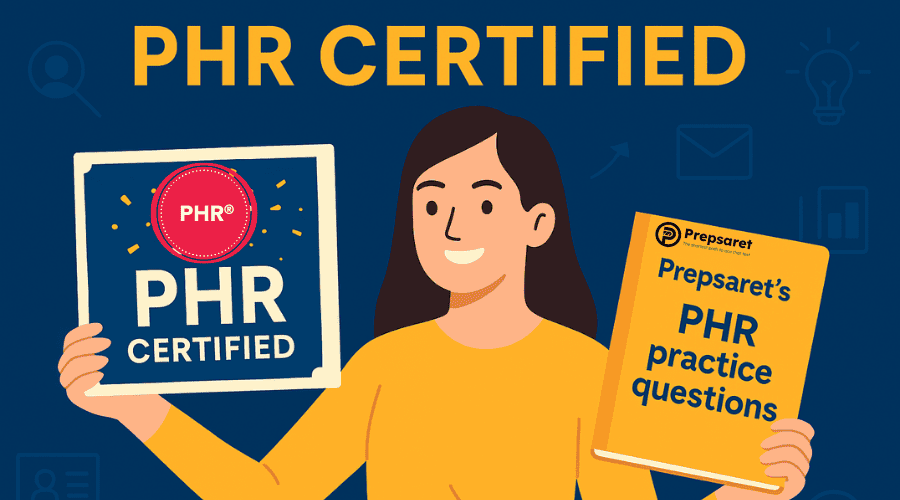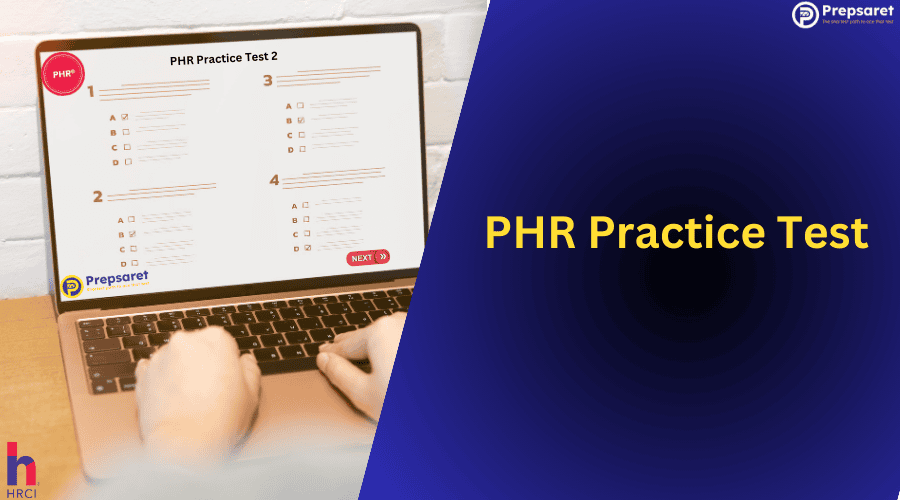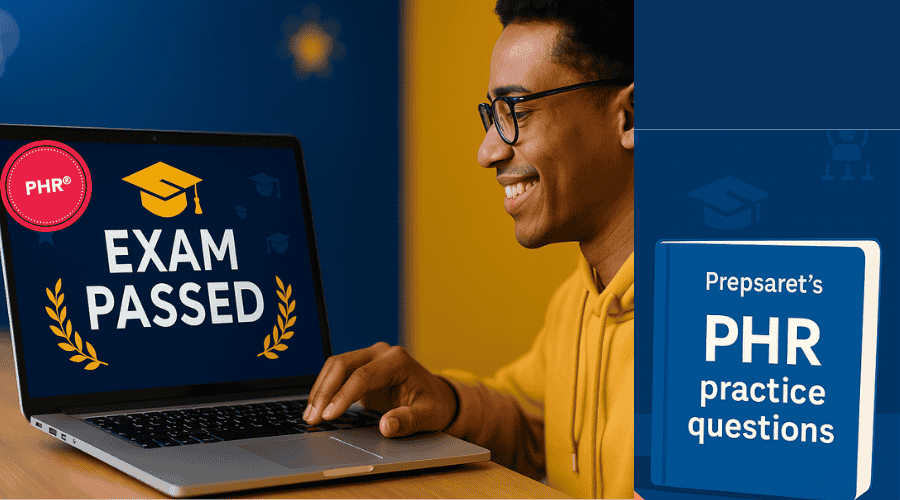I finally passed the PHR exam—and it still feels a little surreal to say that out loud. It’s been a long time coming, and I want to share exactly how I did it, especially for those juggling work and life while trying to prepare for this beast of a test.
Honestly, I had my doubts about whether I could do it, but I was committed to giving it my all. And now, here I am, officially PHR certified and proud of it.
Why I Decided to Get PHR Certified?

Even though I’ve been working in HR for nearly four years and I have gained a lot of on-the-job experience, I felt that getting the PHR certification would give me the confidence and credibility I needed to take my career to the next level. I felt like there were areas where my knowledge was mostly “learn-as-you-go.”
I wanted to back up my experience with a solid credential, something that not only validated what I already knew, but also filled the gaps. I also wanted to prove to myself that I could handle the challenge, especially given that HR can sometimes feel like a very vast field with so much to learn. PHR felt like the right step—challenging enough to be meaningful, but also achievable with focused effort.
How I Studied for the PHR Exam
As a current HR Coordinator at a mid-sized company, my days are filled with tasks like managing employee relations, recruitment, and handling various HR processes. It’s a rewarding role, but it’s also a demanding one. That meant nights and weekends were my only windows for study, and I had to make them count.
I scheduled my PHR exam in January, giving myself exactly two months to prepare. My plan was to study in the evenings after work, which didn’t leave me much time. But I had to make it work. I started by researching what resources I would need, and after reading a lot of forum posts and talking to colleagues, I came up with a study plan.
Since I only had two months, I knew I had to be strategic. I broke the study time into two phases: one month for understanding the material and the second month for intensive practice and reviewing weaknesses. These are the study materials I used:
HR Certification Institute (HRCI) Body of Knowledge (BoK)
I referred to the HRCI Body of Knowledge. This gave me a deep understanding of the PHR exam’s core topics, and I made sure to spend at least a week on each of the five functional areas. The reading was dense, but I found it useful for context and understanding how to apply the theoretical knowledge I had gained from work experience.
The downside? The BoK was a bit dry. I found myself skimming some sections and often felt that the material was repetitive. But it was still essential for gaining an in-depth understanding of the exam topics.
Prepsaret PHR Practice Exams

This was by far the most helpful resource for me. They provided a large bank of free PHR practice questions with detailed explanations for each answer, including why some choices were incorrect.
- I completed 40-50 questions each night after work, taking time to review the explanations thoroughly.
- The format closely mirrored the actual exam, which made me more comfortable with the structure and types of questions.
By the end of my first round of practice tests, I was consistently scoring around 80%. While I knew I still had room to improve, the practice exams gave me a strong foundation and boosted my confidence for the real test.
PocketPrep PHR App
After I felt like I had a solid foundation from the BoK, I switched gears and began using PocketPrep PHR. I liked this app because it was so easy to access during any downtime, like on my lunch break or during commuting.
The app had a large number of questions that I could work through quickly, and it was great for testing my knowledge and seeing where I needed improvement. The explanations of the correct answers were incredibly detailed, which helped reinforce the concepts.
The app also allowed me to track my progress, and I spent the second month focusing heavily on it to hone my skills and identify weak spots. By the end of my study, I was consistently scoring in the high 80s on the PocketPrep quizzes.
PHR/SPHR Exam for Dummies
In the final few weeks, I picked up the PHR/SPHR Exam for Dummies book to get a well-rounded perspective. The book included a few practice tests and a ton of useful tips on test-taking strategies.
Honestly, I didn’t rely on this resource as much as I thought I would, mainly because I was already deep into practice questions at that point, but the tips it offered for test day made me feel more confident. It also helped me brush up on the finer details, such as compliance regulations and key HR laws, which are vital for the exam.
MindEdge PHR Online Course
This one… wasn’t for me. I tried it because it came recommended by a colleague and was part of a bundle I had access to through work. But I found the format dry, and the interface was clunky. I struggled to stay focused and barely made it halfway through. Eventually, I just decided to let it go and focus more on the practice questions and reading. No regrets there.
Read more: PHR Study Guide
What Didn’t Help
There was one resource that didn’t work as well for me, and that was the MindEdge HR Course. I had heard positive things about it, so I gave it a try in the early stages of my prep. However, I found it to be very theoretical and not as interactive as I had hoped.
The lessons were long, and the content felt too much like reading a textbook without offering enough practice questions. By the time I realized it wasn’t helping me as much, I had already spent too much time on it, and I quickly shifted my focus to the more practical resources like the Prepsaret practice exams and PocketPrep app.
Exam Day and Results
The day of the exam came, and I honestly didn’t know what to expect. I was a bit nervous but also feeling prepared. The exam itself was challenging, especially when it came to the situational questions.
I had to analyze case studies and make decisions based on different HR scenarios, which was harder than I anticipated. Some of the questions left me second-guessing my answers, and I found myself really focusing on eliminating the obviously wrong choices.
There were also a few questions related to HR metrics and compliance that tripped me up. I found those the hardest, as they required a very specific understanding of laws and formulas I hadn’t worked with in detail at my current job. I didn’t have much time to revisit the flagged questions, but I did my best to mark the ones I felt unsure about.
When I clicked “Submit” at the end of the exam, I was certain I had failed. I thought I had done poorly, especially with the time crunch. But later that evening, when I checked my results, I was in complete shock—I had passed! I scored an 84% overall, which I was really happy with. I had expected to score lower, so seeing that number made all the effort worth it.
Read more: PHR Exam Prep & Study Guide
Final Thoughts
If I could do it over again, I’d try to start studying earlier, maybe take longer than two months to prepare. But despite the time crunch, I’m proud of how I managed to balance work and studying.
The key for me was consistent practice and using resources like Prepsaret and PocketPrep, which gave me a solid mix of theoretical knowledge and practical question formats. If you’re preparing for the PHR exam, I recommend sticking to practice questions and finding resources that allow you to drill down on your weak points.
Read more: How to get PHR certification
FAQs
How Many People Pass a PHR on the First Try?
Approximately 65-70% of candidates pass the PHR exam on their first attempt. Success rates increase significantly with structured study plans, practice exams, and professional preparation courses.
What Is the Pass Rate for the PHR Exam?
The overall pass rate for the PHR exam typically ranges between 65-75%, according to HRCI data. This rate fluctuates slightly year to year as exam content evolves to reflect current HR practices.
How Long Should I Study for the PHR Exam?
Most successful candidates study for 3-4 months, dedicating 60-120 total hours. Your specific timeline depends on HR experience, education background, and familiarity with the six functional areas covered.
Get PHR Certified Today! Good luck, and don’t doubt yourself—you’ve got this!

